” Any sufficiently advanced technology is indistinguishable from magic.”
Sir Arthur C Clarke?(16 December 1917?? 19 March 2008)
“Oh you are going to take pictures? Let me put on my sincere smile. Don’t manage it all the time.” He chuckled, as he stroked his belly. I should have been awed by a man who had propagated the idea of the geostationary satellite. Arthur C Clarke was the author of one of the most significant books on science fiction, and has inspired the names of lost dinosaurs and spacecraft. I had not been sure what to expect. But he quickly put me at ease. “I’ll protect you from Pepsi.” He said, stroking the Chihuahua that curled up on his lap. “He fought a hound.”
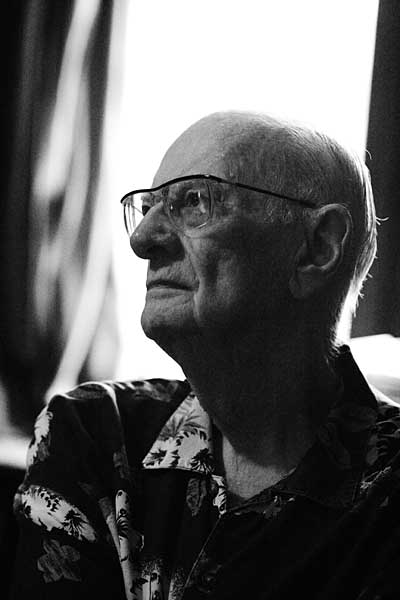
Sir Arthur C Clarke who died early morning on the 19th March 2008 at a hospital in Colombo, Sri Lanka, where he had lived since the 1950s. ? 2001. Shahidul Alam/Drik/Majority World
I turned up at the designated time of 9:00 am at 25 Barnes Place in Colombo 7. I remember peering curiosly at the satellite dish through the bushes. Not too many people had a VSAT in their back garden in those days. Fittingly, it was the year 2001. I was in Colombo conducting a workshop for World Press Photo. I had also hoped to photograph Chandrika for my story “Women Leaders of South Asia”. It was going to be a busy trip. These are the times when you mobilise your friends into action. My friend Nalaka Gunawardene had arranged the appointment with Clarke. Chulie de Silva had finally pegged down an appointment with Chandrika. Sir Clarke was skeptical about my prospects for photographing the president. “Do you think she’ll see you at 4:30?” He said and then went into this funny tale of how Chandrika was always late, and always charming, going into great detail on the vegetarian meal the former president had served that day. The Science Fiction visionary was also good at short term predictions. Soon before the appointment, Chandrika’s secretary called to express her regrets.
He was childlike in his enthusiasm and insisted that I read the book on Polar bears he had just been given. Then he brought out the email by his friend Swarch the holography expert who had sent him 3D images, “including some nudes” he mischievously added. Then came out the hardback copy of Lionel Went’s book with original prints. The conversation flew in all directions. Blue and green lasers. Stereo images. Aerial photography. His ISDN connection. The Video Live Link which he’d used to communicate with Japan’s head of IT. “Must get Nalaka to get all these photographs scanned by you,” he said as he brought out piles of 35mm Kodachromes. We were like kids in a junk shop. It was hard to imagine that I was with the octogenarian king of Sci Fi as this genial man scurried around his large library. “Don’t go to the swimming club,” he suddenly said out of the blue. “It’s only for the posh. Until recently they didn’t allow natives.” I was flattered by the camaraderie.
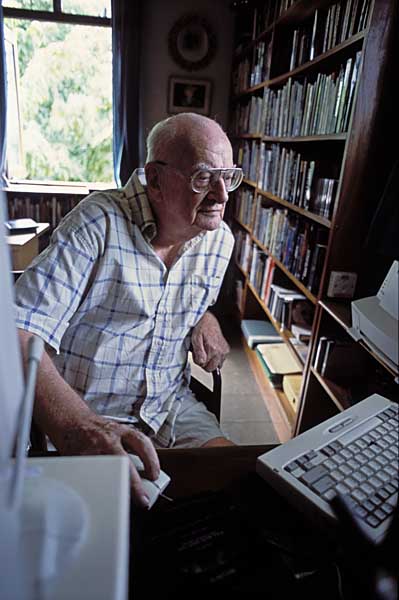
Sir Clarke at his computer in the library at his residence at 25 Barnes Place, Colombo 7. Sri Lanka. ? 2001. Shahidul Alam/Drik/Majority World
Nalaka had asked me not to tire him too much, so I didn’t push the picture taking, instead we played that morning. Our workshop was taking place at the Galle Face Hotel. On the last day of the workshop, all I had was a public lecture. The flight was at night, so I had some free time. I had just walked out of the hotel onto the nearby roundabout when this red Mercedes pulled up. Sir Clarke wanted me to go with him to his club. I watched him play a vicious game of table tennis. Then we went back to Barnes Place and of course I took some more pictures. “Glad I won both games,” said a playful Clarke.
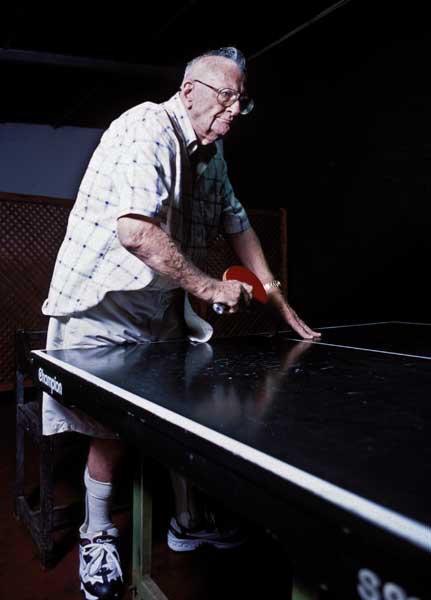
Sir Clarke playing table tennis at his local club in Colombo. Sri Lanka. ? 2001. Shahidul Alam/Drik/Majority World
There were things we never got to talk about. His failed marriage. The Sunday Mirror accusation that he was a paedophile. He was cleared in the formal investigation and The Sunday Mirror later printed a retraction. He was to receive his knighthood from the Prince of Wales during the prince’s visit to Sri Lanka, but Clarke had felt it would be inappropriate given the scandals. He was made a Knight Bachelor later, on May 26, 2000.
Here was a man who had consistently come up with some of the most innovative ideas in modern telecommunications. The technologies he foretold have become integral parts of modern living. His stories have inspired entire generations. In 2001: A Space Odyssey as the supercomputer HAL is being switched off, with his logic completely gone, HAL begins singing the song Daisy Bell. One might see this as speech synthesis, but Clarke saw it as that twilight zone between humans and machine, as the human face of artificial intelligence. Nalaka and I were scared of losing the author’s insight. Despite having written over 100 books, and published over 1000 articles, the anecdotes, the wit, enormous wealth of knowledge, the joy of life of this remarkable man would disappear with him. This was the man who had believed, “The only way of discovering the limits of the possible is to venture a little way past them into the impossible.” Despite his youthfulness, he was getting old, and both of us knew the clock was ticking. He had wanted me to scan the photographs. We wanted to peer into his mind, for the stories behind the images.
Last year, while I was in Sri Lanka for another assignment, Nalaka arranged for another photo shoot. A slightly more official one. Pepsi had died. At ninety Clarke could no longer play table tennis. But his mind was as sharp as ever. That was the last photo shoot that Sir Arthur was to feature in.
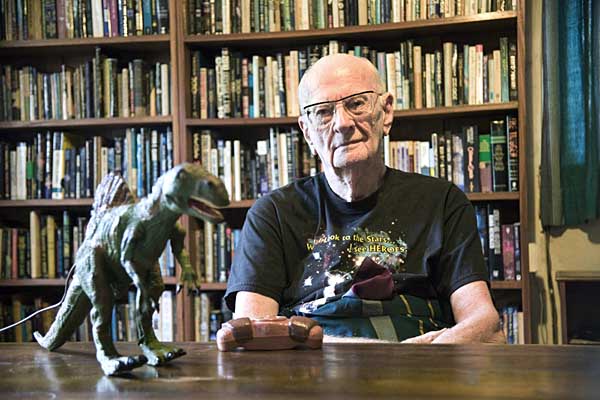
Sir Clarke with a dinosaur . Sri Lanka. ? 2001. Shahidul Alam/Drik/Majority World
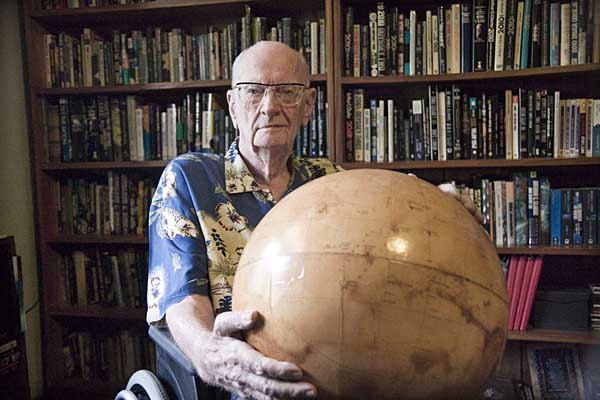
Sir Clarke with globe. Sri Lanka. ? 2001. Shahidul Alam/Drik/Majority World

Sir Clarke had put on his favourite Nehru jacket for this photograph at his residence at 25 Barnes Place, Colombo 7. Sri Lanka. ? 2001. Shahidul Alam/Drik/Majority World
I had asked him for two autographs. One for my friend Maarten of World Press Photo and one for my mother. My regret was not that I didn’t have one for myself, but that like so many unfinished projects, the stories behind those photographs he had wanted me to scan, will never now be told.
But the world will remember his magic.




Leave a Reply
You must be logged in to post a comment.